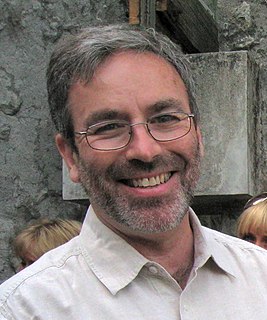In computing, a compiler is a computer program that translates computer code written in one programming language into another language. The name "compiler" is primarily used for programs that translate source code from a high-level programming language to a lower level language to create an executable program.

C is a general-purpose, procedural computer programming language supporting structured programming, lexical variable scope, and recursion, with a static type system. By design, C provides constructs that map efficiently to typical machine instructions. It has found lasting use in applications previously coded in assembly language. Such applications include operating systems and various application software for computer architectures that range from supercomputers to PLCs and embedded systems.

Pascal is an imperative and procedural programming language, designed by Niklaus Wirth as a small, efficient language intended to encourage good programming practices using structured programming and data structuring. It is named in honour of the French mathematician, philosopher and physicist Blaise Pascal.

Turing is a Pascal-like programming language developed in 1982 by Ric Holt and James Cordy, then of University of Toronto, in Toronto, Ontario, Canada. Turing is a descendant of Euclid, Pascal and SP/k that features a clean syntax and precise machine-independent semantics.
Yacc is a computer program for the Unix operating system developed by Stephen C. Johnson. It is a Look Ahead Left-to-Right (LALR) parser generator, generating a LALR parser based on a formal grammar, written in a notation similar to Backus–Naur Form (BNF). Yacc is supplied as a standard utility on BSD and AT&T Unix. GNU-based Linux distributions include Bison, a forward-compatible Yacc replacement.
Small-C is both a subset of the C programming language, suitable for resource-limited microcomputers and embedded systems, and an implementation of that subset. Originally valuable as an early compiler for microcomputer systems available during the late 1970s and early 1980s, the implementation has also been useful as an example simple enough for teaching purposes.

Malcolm Douglas McIlroy is a mathematician, engineer, and programmer. As of 2019 he is an Adjunct Professor of Computer Science at Dartmouth College. McIlroy is best known for having originally proposed Unix pipelines and developed several Unix tools, such as spell, diff, sort, join, graph, speak, and tr. He was also one of the pioneering researchers of macro processors and programming language extensibility. He participated in the design of multiple influential programming languages, particularly PL/I, SNOBOL, ALTRAN, TMG and C++.

Southwest Technical Products Corporation, or SWTPC, was a US producer of electronic kits, and later complete computer systems. It was incorporated in 1967 in San Antonio, Texas, succeeding the 1964 DEMCO. Around 1990, SWTPC became Point Systems, before ceasing a few years later.
The Syntax/Semantic Language (S/SL) is an executable high level specification language for recursive descent parsers, semantic analyzers and code generators developed by James Cordy, Ric Holt and David Wortman at the University of Toronto in 1980.

James Reginald Cordy is a Canadian computer scientist and educator who is Professor Emeritus in the School of Computing at Queen's University. As a researcher he is most recently active in the fields of source code analysis and manipulation, software reverse and re-engineering, and pattern analysis and machine intelligence. He has a long record of previous work in programming languages, compiler technology, and software architecture.
Euclid is an imperative programming language for writing verifiable programs. It was designed by Butler Lampson and associates at the Xerox PARC lab in the mid-1970s. The implementation was led by Ric Holt at the University of Toronto and James Cordy was the principal programmer for the first implementation of the compiler. It was originally designed for the Motorola 6809 microprocessor. It was considered innovative for the time; the compiler development team had a $2 million budget over 2 years and was commissioned by the Defense Advanced Research Projects Agency of the U.S. Department of Defense and the Canadian Department of National Defence. It was used for a few years at I. P. Sharp Associates, MITRE Corporation, SRI International and various other international institutes for research in systems programming and secure software systems.
XPL is a programming language based on PL/I, a portable one-pass compiler written in its own language, and a parser generator tool for easily implementing similar compilers for other languages. XPL was designed in 1967 as a way to teach compiler design principles and as starting point for students to build compilers for their own languages.
Whitesmiths Ltd. was a software company founded in New York City by P. J. Plauger, Mark Krieger and Gabriel Pham, and last located in Westford, Massachusetts. It sold a Unix-like operating system called Idris, as well as the first commercial C compiler, Whitesmiths C.

In computer programming, Franz Lisp is a discontinued Lisp programming language system written at the University of California, Berkeley by Professor Richard Fateman and several students, based largely on Maclisp and distributed with the Berkeley Software Distribution (BSD) for the Digital Equipment Corporation (DEC) VAX minicomputer. Piggybacking on the popularity of the BSD package, Franz Lisp was probably the most widely distributed and used Lisp system of the 1970s and 1980s.
TUNIS was a Unix-like operating system, developed at the University of Toronto in the early 1980s. TUNIS was a portable operating system compatible with Unix V7, but with a completely redesigned kernel, written in Concurrent Euclid. Programs that ran under Unix V7 could be run under TUNIS with no modification.
Gambit, also called Gambit-C, is a programming language, a variant of the language family Lisp, and its variants named Scheme. The Gambit implementation consists of a Scheme interpreter, and a compiler which compiles Scheme into the language C, which makes it cross-platform software. It conforms to the standards R4RS, R5RS, and Institute of Electrical and Electronics Engineers (IEEE), and to several Scheme Requests for Implementations (SRFIs). Gambit was released first in 1988, and Gambit-C (Gambit with a C backend) was released first in 1994. They are free and open-source software released under a GNU Lesser General Public License (LGPL) 2.1, and Apache License 2.0.
In computing, a compiler is a computer program that transforms source code written in a programming language or computer language, into another computer language. The most common reason for transforming source code is to create an executable program.

Human Computing Resources Corporation, later HCR Corporation, was a Canadian software company that worked on the Unix operating system and system software and business applications for it. Founded in 1976, it was based in Toronto.







